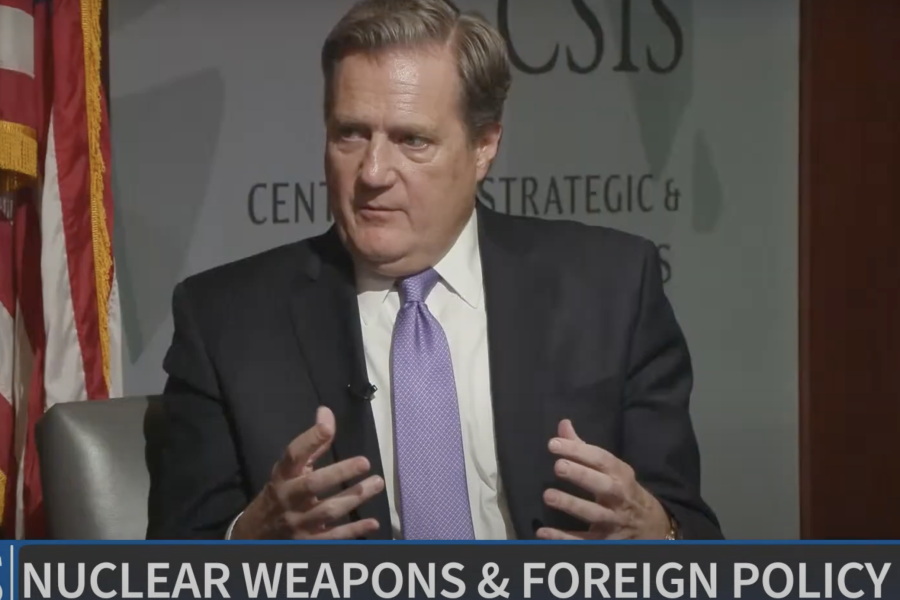Four months after issuing a public warning that was revealed to be about Russia developing a nuclear anti-satellite program, leading lawmaker Rep. Mike Turner still thinks the White House needs to do more to reveal details about the threat and subsequently deter Moscow from deploying it.
Yet at least one expert believes such actions must be approached cautiously.
Turner, the head of the House Intelligence committee, renewed his warnings about the Russian space nuke at a Center for Strategic and International Studies event on June 20, saying President Joe Biden’s administration is “sleepwalking” into “Day Zero,” a term Chief of Space Operations Gen. B. Chance Saltzman has used to describe the launch date of such a nuclear anti-satellite weapon.
“In order to avoid Day Zero, the Biden administration must immediately declassify all known information concerning the status of Russia’s nuclear anti-satellite weapons program,” Turner argued.
Turner’s warning in February prompted media reports and eventually a statement from the National Security Council that the danger involved an anti-satellite weapon the Russians have been developing that would violate an international treaty that bans the deployment of nuclear weapons in space.
Assistant Secretary of Defense for Space Policy John F. Plumb confirmed last month that Russia was developing an “indiscriminate” nuclear weapon designed for deployment in space, emphasizing its potential devastating impacts on communications, commerce, and national security. He added that while the threat isn’t “imminent,” the Pentagon is concerned about it.
However, disclosing all information about the threat to the public, as Turner suggests, could come with risks, said Charles Galbreath, senior fellow at the Mitchell Institute for Aerospace Studies.
“It is a question of what do we divulge, and to whom, and for what reasons,” Galbreath told Air & Space Forces Magazine, highlighting the different needs and understanding of political leadership, the military, and the public. “What are we gaining from making something public? Because once we reveal how we know, that would potentially burn the source, and any additional information that we could have received from that source is then lost.”
Beyond more disclosure, Turner also called for the White House and Pentagon to crank up actions and suggested that every option— including economic sanctions and military measures—should be on the table.
“You do not hear the administration saying, ‘That red line is so great that we are going to implement an additional regime of financial restrictions, sanctions,’ and even look what we are going to do with our allies and NATO to make a strong statement to Russia, to understand that this is not something that is going to be accepted,” said Turner.
Galbreath noted that economic sanctions have thus far been ineffective in deterring Russia from aggressive actions, such as in Ukraine.
“An option would be to persuade Russia that the international community, including nations like China, would all be adversely affected by the detonation of a nuclear weapon in orbit,” said Galbreath. “We would view any nation that committed such an act as a terrorist state rather than a legitimate government. The entire globe would take action to prevent them from ever having that capability again in the future.”
Space Development Agency director Derek M. Tournear has also suggested a global response would be needed to respond to a nuclear weapon in space, calling its potential use an “attack on the world.”
If Russia were to detonate such a weapon system in space, the ramifications could quickly spill over into everyday life. During the Cold War-era “Starfish Prime” test in 1962, the U.S. detonated a nuclear weapon in low-Earth orbit, disabling eight out of 24 satellites and causing a power blackout in Hawaii.
To prepare for Russia’s weapon, Galbreath said the U.S. should enhance the resilience of its satellite systems by proliferating them and making them less susceptible to nuclear events.
“A few of our satellites today have radiation shielding and multiple redundancies, ensuring that if one subsystem fails, another can back it up,” said Galbreath. “With less expensive satellites, they lack the levels of redundancy or shielding, but cheaper satellites can be replenished by launching new ones, as their design life is typically only a couple of years. So, through a combination of shielding some assets and reconstituting lost assets rapidly, any effect from a nuclear detonation space could be minimized.”
After Turner’s criticism, White House national security spokesperson John Kirby said the administration has been “working hard” to persuade other nations to join the U.S. in clearly outlining the dangers posed by an anti-satellite weapon designed to carry a nuclear payload.
“We’ve been working this particular problem set from every possible angle, including through intense diplomacy with countries around the world and, obviously, through direct conversations with Russia.” Kirby told reporters on June 20.
Russian President Vladimir Putin has so far denied any intention to deploy nuclear weapons in space. Washington affirmed that such developments would breach international treaties prohibiting nuclear weapons in space.
